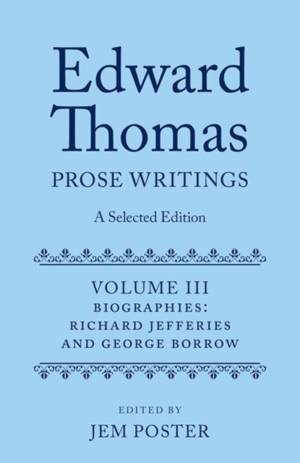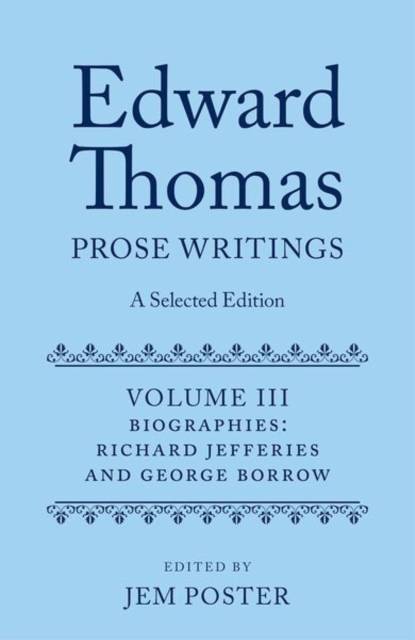
- Retrait gratuit dans votre magasin Club
- 7.000.000 titres dans notre catalogue
- Payer en toute sécurité
- Toujours un magasin près de chez vous
- Retrait gratuit dans votre magasin Club
- 7.000.000 titres dans notre catalogue
- Payer en toute sécurité
- Toujours un magasin près de chez vous
Edward Thomas: Prose Writings: A Selected Edition
Volume III: Biographies
346,45 €
+ 692 points
Description
Edward Thomas is an important figure in the English literary canon, a major twentieth-century poet, he was also one of England's most experienced and respected Edwardian and Georgian critics, and an observer of the countryside second to none. Although he died at the age of only 39, his prose output was massive and encompassed a range of genres: biography, autobiography, essays, reviews, fiction, nature books, travel writings, and anthologies. While Thomas's stature as a poet is widely appreciated, his prose works have yet to be given their critical due - in large part because scholarly editions have hitherto been lacking. Edward Thomas: Prose Writings: A Selected Edition shows that Thomas's prose deserves to be much better known, by literary scholars but also the general reading public. This six-volume edition establishes him as one of the most important prose writers in English, who contributed remarkable ideas and representations of the self and community, the landscape and ecology, literature and history, the spiritual and artistic life. It is the definitive edition of Thomas's prose and a significant scholarly resource for the twenty-first century. The third volume provides the annotated texts of two biographies by Thomas: Richard Jefferies: His Life and Work (1909) and George Borrow: The Man and His Books (1912). A detailed introduction addresses a range of matters relating to the subjects of these two biographies as well as to Thomas's approach to them. Among the topics discussed in relation to Jefferies are: the correspondences between Jefferies' life and Thomas's; the influence of Jefferies on Thomas's thought and writing, including such matters as mystical experience and the passage of time; Thomas's unwarranted anxieties about the quality of the biography; and the high standing of the biography in the century since its publication. Among the topics discussed in relation to Borrow are: Thomas's ambivalence towards his subject; the influence of Borrow on later attitudes to walking and the open air, particularly as these were expressed in literature; the popular and literary interest (again attributable in part to Borrow's influence) in Romani life; and the way in which Thomas's approach to the Borrow biography, with its emphasis on the value of impressions as distinct from facts, chimes with Modernist thinking about the nature of narrative. The edition's extensive notes provide further insights into the texts and their cultural context.
Spécifications
Parties prenantes
- Editeur:
Contenu
- Nombre de pages :
- 594
- Langue:
- Anglais
- Collection :
Caractéristiques
- EAN:
- 9780199588114
- Date de parution :
- 19-09-18
- Format:
- Livre relié
- Format numérique:
- Genaaid
- Dimensions :
- 160 mm x 239 mm
- Poids :
- 975 g






